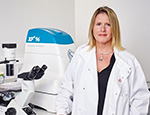
Professor Federica Marelli-Berg
Queen Mary University of London has granted an exclusive patent license to Salt Hill covering a novel invention which uses glucokinase activators to enhance the movement and function of regulatory T cells (Tregs), so that clinicians can better regulate a patient's immune system. The patent encompasses the broad therapeutic applications of glucokinase activators.
The invention is based on research led by Prof Federica Marelli-Berg, BHF Professor of Cardiovascular Immunology at Queen Mary University of London, supported by the British Heart Foundation. Her breakthrough offers a powerful new therapeutic strategy for a wide range of autoimmune and inflammatory conditions.
Prof Federica Marelli-Berg, Professor of Cardiovascular Immunology at Queen Mary University of London, said:
"We discovered that drugs known as glucokinase activators can regulate the immune system by enhancing the movement and function of regulatory T cells, the body's natural 'brakes' on harmful inflammation. This approach has potential not only for inflammatory diseases, but also for tackling infections and improving transplant outcomes."
"Our discovery opens the door to developing new treatments for a wide range of autoimmune and inflammatory conditions. The method has already shown promise in the clinic: a trial in patients with COVID-19 demonstrated that a GCK activator improved immune regulation and patient outcomes."
Salt Hill will now take this innovation forward into therapeutic development. The invention could revolutionise cellular therapy by enabling in vivo activated cell therapy through a small molecule, bypassing the high costs, diminished therapeutic efficacy and complexities associated with conventional ex vivo cell therapies. This could significantly broaden therapeutic accessibility and disease applications.
Salt Hill has been working strategically with Queen Mary to explore the potential of this technology for several years. In 2020 they conducted the Phase II Arcadia trial to investigate the use of AZD1656, a glucokinase activator, to modulate harmful inflammation in diabetic patients hospitalised with COVID-19. Patients receiving treatment demonstrated a restoration of immune homeostasis, accompanied by reduced mortality rates.
More recently, Salt Hill partnered with University College London (UCL) to understand in-depth the immunomodulatory effects of the glucokinase activator AZD1656 using a skin model of inflammation in humans. This work will increase the scientific insight into the potential application for this immunometabolic approach to cellular therapy which harnesses the power of differential migratory and activation mechanisms between different types of T cells.
The awarding of the 2025 Nobel Prize in Physiology or Medicine to researchers in the field of Tregs underscores the growing scientific and clinical importance of these cells. Tregs act as the body's natural brake on harmful inflammation and promote immune tolerance.
While their therapeutic potential spans diseases ranging from Type 1 diabetes to multiple sclerosis, widespread clinical adoption has been constrained by the logistical challenges of cell therapy. Prof Marelli-Berg's invention could overcome these barriers, unlocking new possibilities for treating a wide range of inflammatory and autoimmune conditions.
Professor John Martin, Chair of Salt Hill said:
"This partnership with Queen Mary University of London allows us to explore new approaches to treating immune-mediated diseases, many of which have no treatment or can only be treated by steroids, which can themselves be harmful. This partnership is a leap in medicine's potential to treat autoimmune and inflammatory diseases."






